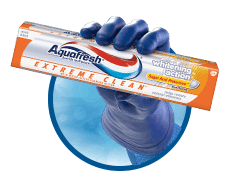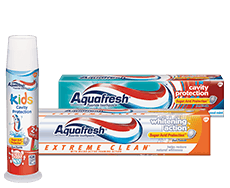When Should You Brush Your Teeth?
You need to brush your teeth regularly with fluoride toothpaste or follow what is recommended by your dental professional to remove plaque bacteria. Plaque is a form of bacteria that is thin and sticky and continuously builds up on your teeth if not regularly brushed away.8 The sugars and starches from the foods you eat will mix with the existing plaque bacteria and form acid that can cause the enamel of your teeth to decay. Regularly brushing your teeth can help keep this acid build up at bay and help remove plaque.1 But how often does brushing regularly mean?
Brushing your teeth regularly means brushing, at a minimum, twice per day for two minutes each time.2 Learn why taking care of your teeth at this frequency makes a positive difference on your oral health.
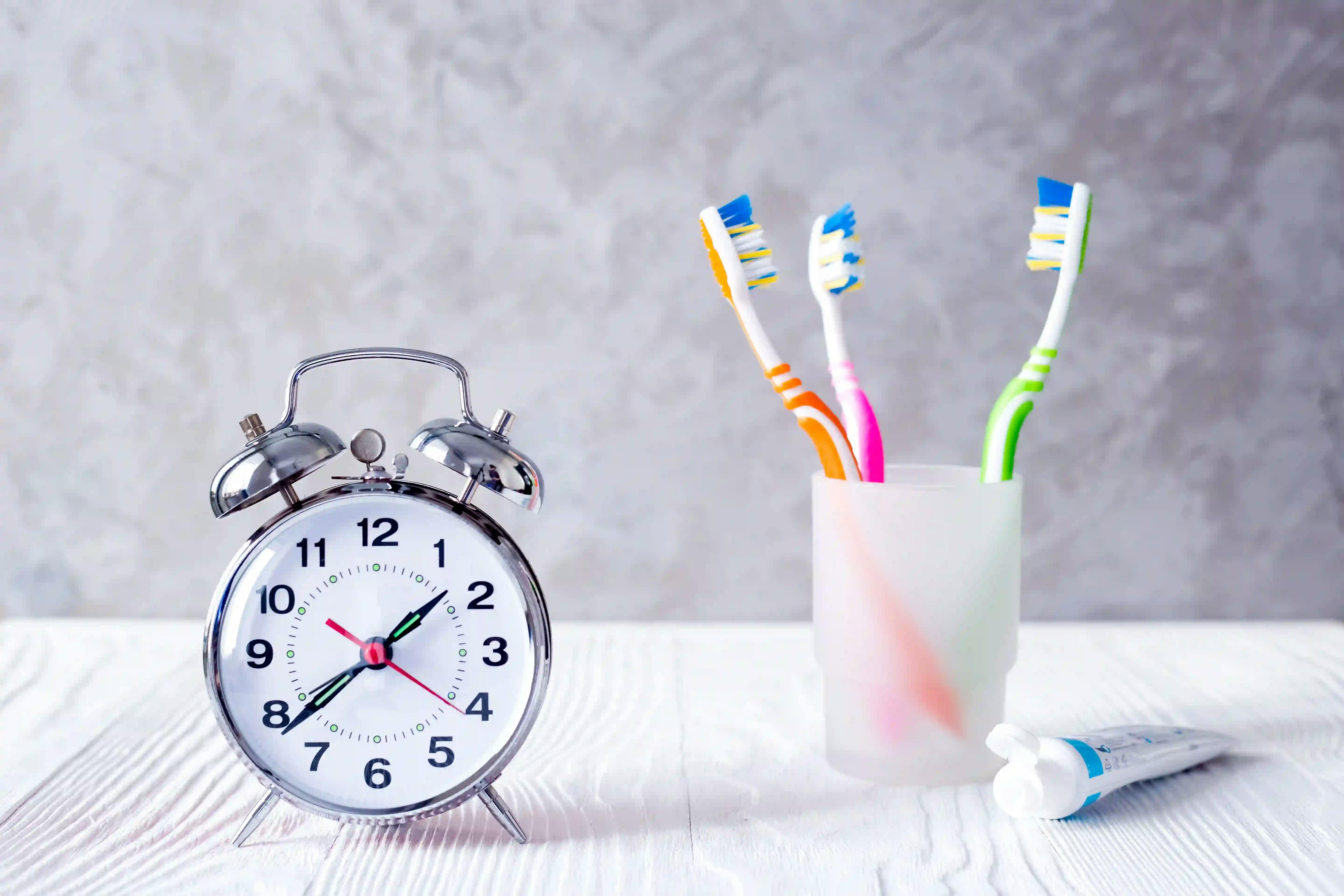
When Should You Brush Your Teeth
According to the American Dental Association, you should brush your teeth twice per day:2
- At least once during the daylight hours
- Once at night as the last thing you do before going to sleep
While the ADA’s recommendation is a good baseline, you should always follow the oral care advice of your dentist or dental processional.
Each time you brush your teeth, be it during the day or night, spit out the toothpaste after brushing and don’t use a rinse; this helps fluoride work on your teeth longer.2
Brush your teeth once during the day. Whether you brush right after waking up or after breakfast is a decision that you and your dental professional should discuss but there is validity for either option. Brushing after you wake up makes sense because your mouth acts like a hothouse, allowing bacteria to grow while you’re sleeping.9 These volatile organic compounds often contain sulfur and lead to foul-smelling morning breath.10
However, if you choose to wait to brush until after you’ve eaten breakfast, that’s not a bad idea, either. Many breakfast foods like pancakes and orange juice, contain sugars and acids that can lead to tooth decay if not dealt with.12 You may feel like you need to reach for your toothbrush immediately after eating, but the ADA recommends waiting an hour after eating to allow your saliva a chance to naturally wash away food debris and re-harden your enamel.11
Whether you brush your teeth as soon as you wake up or after breakfast, the important thing is to take the time to care for your mouth. Make it part of your morning routine and you’ll be less likely to skip it. Talk to your dental professional about creating an oral health routine that works for you. It’s also advisable to brush your teeth right before bed. You are at a risks for cavities and tooth decay, especially at night when there’s decreased salivary flow.12,13 Nightly teeth brushing helps minimize risks of dental caries while also establishing a routine so you won’t forget to brush your teeth. Establish a nightly brushing routine early on in a person’s childhood to nurture good brushing habits that can be maintained for the rest of their life.7,14
The ADA and most dental professionals recommend brushing twice per day.12
How Long Should I Brush My Teeth?
To brush your teeth effectively, you should brush your teeth for two full minutes each time, and be sure to brush all the surfaces of your teeth and all areas of your mouth.2 Your toothbrush should have soft bristles, which will help to minimize the chance of abrasion on your gums, and should be a size and shape that’s appropriate for your mouth and can easily reach all surfaces of your teeth.3 Brushing for two minutes with a fluoride toothpaste each time has been shown to remove significant amounts of plaque.3
Brushing is only part of your daily dental care routine. Clean in between your teeth with floss or interdental brushes once per day to remove plaque and food particles still lingering in your mouth where toothbrush bristles can’t reach.4 Always follow the regimen that your dental professional has given you. If you have any concerns, contact your dental professional immediately.
When Should You Change Toothbrushes?
Frayed and damaged toothbrush bristles won’t clean your teeth properly—it’s even possible that they may damage your gums.2 You should change your toothbrush, or electric toothbrush head, every two or three months. If the filaments become worn or bristles become frayed or matted out before then, change your brush sooner.2 Make sure you’re rinsing your toothbrush thoroughly after brushing to remove any debris and keeping it stored in an upright position so it can dry properly.3 It’s also a good idea to replace your toothbrush if you’ve recently been ill; brushing with a contaminated toothbrush can introduce new microorganisms to your mouth which can affect your overall health.15
Tips for Healthy Brushing Habits
While most people brush their teeth on a regular schedule, many don’t brush properly. Make a few adjustments to your daily routine, and you’ll make a positive impact on your dental health in the long term.1,2
- Brush once during daylight hours
- Brush once before bed
- Brush for two minutes each session
- Clean between your teeth with floss or interdental brushes once per day
- Use fluoride toothpaste and follow the directions on the package or those given by a dental professional
- Spit, don’t rinse after brushing
- Change your toothbrush every two or three months, or sooner
Giving four minutes of time to your teeth each day can improve your oral health. Start today—and also tonight.
Source Citations:
- Caring for My Teeth. Dental Health. https://www.dentalhealth.org/caring-for-my-teeth. Accessed 5/25/23.
- How to Clean Your Teeth. Dental Health. https://www.dentalhealth.org/how-to-clean-your-teeth. Accessed 5/25/23.
- Toothbrushes. ADA.org. https://www.ada.org/resources/research/science-and-research-institute/oral-health-topics/toothbrushes. Accessed 5/25/23.
- Brushing Your Teeth. Mouth Healthy. https://www.mouthhealthy.org/all-topics-a-z/brushing-your-teeth. Accessed 5/25/23.
- Sensitive Teeth. Dental Health. https://www.dentalhealth.org/sensitive-teeth. Accessed 5/25/23.
- Toothbrushing and Oral Health: How Frequently and When Should Tooth Brushing be Performed?. National Library of Medicine. https://pubmed.ncbi.nlm.nih.gov/16355646/. Accessed 5/25/23.
- Bedtime Oral Hygiene Behaviors, Dietary Habits, and Children’s Dental Health. National Library of Medicine. https://www.ncbi.nlm.nih.gov/pmc/articles/PMC8160840/. Accessed 5/25/23.
- Plaque and tartar on teeth. MedlinePlus. https://medlineplus.gov/ency/article/002044.htm. Accessed 10/23/23.
- Bad Breath. MouthHealthy. https://www.mouthhealthy.org/all-topics-a-z/bad-breath. Accessed 10/24/23.
- Volatile composition of the morning breath. National Library of Medicine. https://pubmed.ncbi.nlm.nih.gov/36055216/. Accessed 10/24/23.
- Erosion: What You Eat and Drink Can Impact Teeth. MouthHealthy. https://www.mouthhealthy.org/all-topics-a-z/dietary-acids-and-your-teeth. Accessed 10/24/23.
- Nutrition: What You Eat Affects Your Teeth. MouthHealthy. https://www.mouthhealthy.org/nutrition/food-tip. Accessed 10/24/23.
- The significance of saliva during sleep and the relevance of oromotor movements. National Library of Medicine. https://pubmed.ncbi.nlm.nih.gov/12531122. Accessed 10/24/23.
- Bedtime Oral Hygiene Behaviours, Dietary Habits and Children’s Dental Health. National Library of Medicine. https://pubmed.ncbi.nlm.nih.gov/12531122. Accessed 10/24/23.
- Contaminated tooth brushes-potential threat to oral and general heath. https://www.ncbi.nlm.nih.gov/pmc/articles/PMC4535112/. Accessed 10/24/23.
Am I Flossing Correctly?



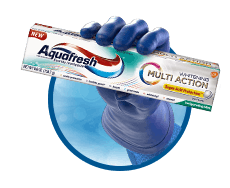
Aquafresh® Multi Action® Whitening can help brighten your smile in no time.
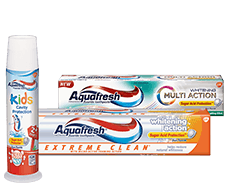
Get 75¢ off any one Aquafresh® product.

Check out more from Captain Aquafresh® to learn how to fight cavities.
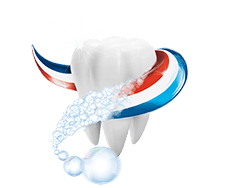
Learn more about your oral health and how Aquafresh® helps keep you feeling clean.



